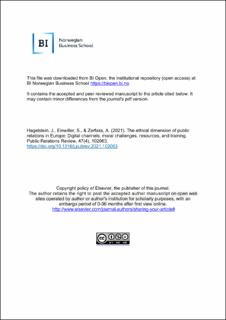| dc.contributor.author | Hagelstein, Jens | |
| dc.contributor.author | Einwiller, Sabine | |
| dc.contributor.author | Zerfass, Ansgar | |
| dc.date.accessioned | 2023-09-18T09:37:34Z | |
| dc.date.available | 2023-09-18T09:37:34Z | |
| dc.date.created | 2021-06-03T15:10:31Z | |
| dc.date.issued | 2021 | |
| dc.identifier.citation | Public Relations Review. 2021, 47 (4), . | en_US |
| dc.identifier.issn | 0363-8111 | |
| dc.identifier.uri | https://hdl.handle.net/11250/3090019 | |
| dc.description.abstract | Digital communication tools and practices improve the spread and impact of organisational messages. Quite often, however, they also pose moral problems. This article examines how often public relations practitioners encounter moral issues in their day-to-day work, how they assess digital communication tools and practices in terms of ethics, and the resources on which they rely to tackle moral challenges. Four research questions were addressed in an online survey among 2,324 practitioners who work in PR departments of organisations or in PR agencies across Europe. Results show that PR practitioners face more moral challenges in their daily work than they have faced in the past. Regarding digital communication tools and practices, they report moral concerns especially related to using bots, exploiting personal data for big-data analyses, paying social media influencers, and using sponsored content. Personal values and beliefs are the most important resource for dealing with moral issues—whether because only a minority of practitioners has participated in any formal ethics training within the past three years, or because existing ethical guidelines are outdated. Results call for the development of ethical guidelines that can provide explicit advice in the area of digital communication. Furthermore, structured training programs and ethics courses in graduate programs are needed to enhance practitioners’ ethical knowledge. | en_US |
| dc.language.iso | eng | en_US |
| dc.publisher | Elsevier | en_US |
| dc.rights | Attribution-NonCommercial-NoDerivatives 4.0 Internasjonal | * |
| dc.rights.uri | http://creativecommons.org/licenses/by-nc-nd/4.0/deed.no | * |
| dc.subject | Ethics | en_US |
| dc.subject | Moral challenges | en_US |
| dc.subject | Digital communication | en_US |
| dc.subject | Social media | en_US |
| dc.subject | Public relations | en_US |
| dc.subject | Survey | en_US |
| dc.title | The ethical dimension of public relations in Europe: Digital channels, moral challenges, resources, and training | en_US |
| dc.type | Peer reviewed | en_US |
| dc.type | Journal article | en_US |
| dc.description.version | submittedVersion | en_US |
| dc.rights.holder | Elsevier | en_US |
| dc.source.pagenumber | 9 | en_US |
| dc.source.volume | 47 | en_US |
| dc.source.journal | Public Relations Review | en_US |
| dc.source.issue | 4 | en_US |
| dc.identifier.doi | 10.1016/j.pubrev.2021.102063 | |
| dc.identifier.cristin | 1913606 | |
| cristin.ispublished | true | |
| cristin.fulltext | preprint | |
| cristin.qualitycode | 1 | |

